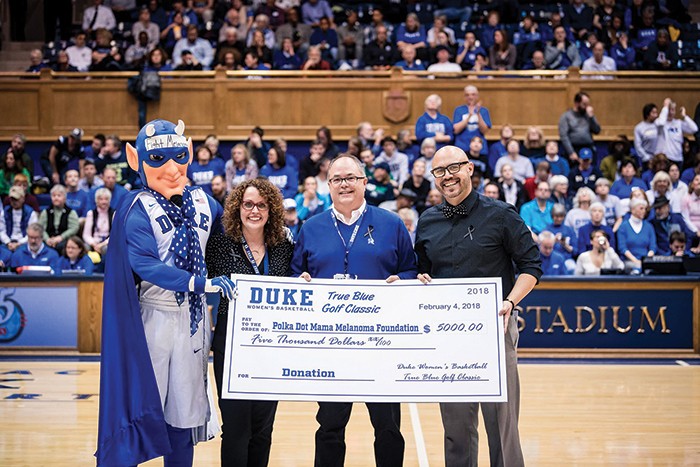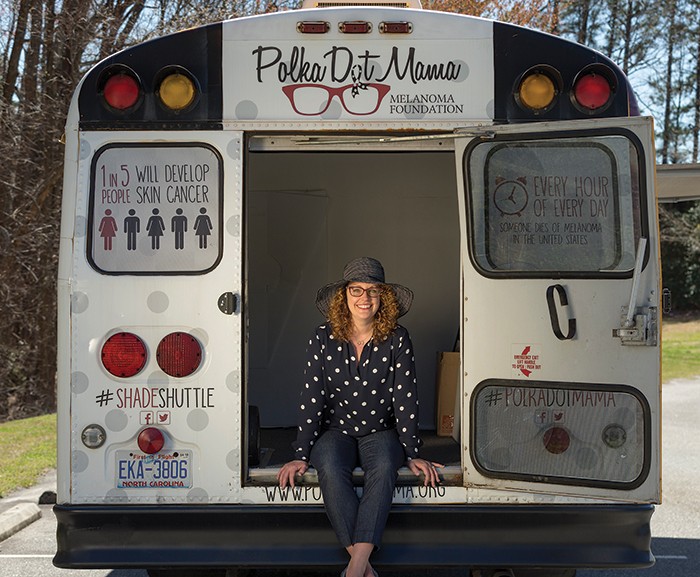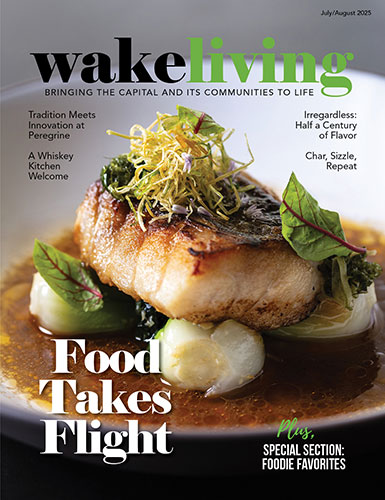Tracy Callahan doesn’t hate the sun, but she does have a healthy respect for it — healthy being the key word.
The four-time survivor of melanoma is the founder and face of the Polka Dot Mama Melanoma Foundation, a Cary-based nonprofit focused on skin cancer prevention, early detection and safe sunning education.

The nonprofit’s annual Taste for a Cure Gala has sold out every year the fundraiser has been held. This year’s event, on April 28, featured 15 chefs, 300 attendees and keynote speaker Dr. Jerome Adams, surgeon general of the United States.
“We don’t want people to live inside. We live in this gorgeous state. Just think about it, and check yourself, check your spots. It could truly save your life. It obviously saved mine,” said Callahan, whose two sons nicknamed her “the polka dot mama” after her first melanoma diagnosis in 2015.
She launched the nonprofit with the first Taste for a Cure Gala nearly four years ago. She hoped to raise $30,000 from the formal, five-course dinner, which was held at a barn in Oxford, N.C. The event sold out, and it raised $100,000 for melanoma research.
“It was at that point we thought, OK, I think we’re onto something,” said Callahan.
The nonprofit’s mission soon shifted from funding research to funding prevention efforts, although Polka Dot Mama continues to award small grants for projects done at local universities by medical students and residents. So far, the nonprofit has donated $60,000 for melanoma research.
Callahan, who was trained as a nurse, says Polka Dot Mama’s message is being heard on bigger platforms and by wider audiences. Dr. Jerome Adams, surgeon general of the United States, was the keynote speaker at the foundation’s annual gala fundraiser in April, and the nonprofit was recently invited to join the National Council on Skin Cancer Prevention.
“The biggest bit of momentum has been in the last year, with more national organizations leaning on us, collaborating with us, realizing that we are laser-focused on our mission, and we’re staying true to it,” she said.
Wear sunscreen. UV radiation can damage skin even in the winter and on cloudy days. Use broad-spectrum sunscreen with SPF of at least 30.
Wear protective clothing. Not a fan of sunscreen? Cover up with sun-protective clothing, an umbrella, hat and sunglasses.
Avoid peak rays. Seek shade from 10 a.m. to 4 p.m. when the sun is most intense.
Don’t use tanning beds. Indoor tanning has been shown to increase the risk of melanoma by up to 75 percent.
Protect children. Just one bad sunburn doubles your child’s chances of developing melanoma later in life.
Source: Polka Dot Mama Melanoma Foundation
Free screenings
Key to that mission are free twice-monthly skin cancer screenings, one at a Chapel Hill doctor’s office and the second at various locations in the Triangle and beyond. Polka Dot Mama partners with more than 40 volunteer dermatologists.
Dr. Elizabeth Ju, with North Carolina Dermatology Associates, is on the board of Polka Dot Mama Melanoma Foundation. Her practice was one of the first that Callahan enlisted to perform free screenings, and Ju says increasing rates of skin cancer make the nonprofit’s work vital.
“Early detection through screening can save lives,” she said. “Melanomas can affect all ages, all ethnicities and does not discriminate. We have screened 1,400 patients in the last two years with skin cancers identified in 15 to 20 percent of those screened.”
Polka Dot Mama will host its largest free screening event this month in Durham. The nonprofit will attempt to break the Guinness World Record for largest skin cancer screening. Organizers hope to recruit 1,000 patients for the event.
The Shade Shuttle, a refurbished school bus and mobile exam room, is another way the nonprofit spreads the word about sun safety. Donated by a New Jersey couple whose daughter died of melanoma, the bus is driven to screening events throughout North Carolina.
A tough message
In this beach-loving state, Callahan faces challenges, especially when she hosts screenings closer to the coast. When people say they’ve lived outside all their lives, she shifts her message to early detection, offering them a sticker with a friendly Dalmatian reminding them to “Check Your Spots.”
But she becomes animated when the subject of tanning booths is raised. As a young woman, the fair-skinned, freckled Callahan used tanning booths and links them to her cancer diagnosis. Studies have shown that indoor tanning raises the risk of skin cancer by 75 percent.

Tracy Callahan accepts a ceremonial check, proceeds from the True Blue Golf Classic in 2017. The Polka Dot Mama Melanoma Foundation and the Duke women’s basketball program also partnered for the 2018 golf fundraiser. Joanne McCallie, head coach for Duke women’s basketball, is a five-time melanoma survivor and a longtime supporter of the nonprofit.
“We are in a culture where we have more tanning salons in North Carolina than we have McDonald’s,” she said. “Whether you go to N.C. State, Duke or UNC, 90 percent of off-campus housing has free tanning as a part of the package. We don’t put in cigarette machines, but we put in these cancer tubes.”
The popularity of indoor tanning among teens and young adults is one reason Polka Dot Mama targets middle-schoolers with in-school projects about the “Sun Smart Life.” By explaining that tanning booths are especially risky, the nonprofit hopes to convince pre-teens to avoid them.
Save the Daves
Callahan measures the success of Polka Dot Mama by the number of patients seen. She rarely hears what happens to people after they leave the screenings. But recently, she spoke with one man whose life was changed — and perhaps saved.
Over the course of their lifetimes, 1 in 5 Americans will be diagnosed with melanoma.
2,700 North Carolinians are expected to be diagnosed with melanoma this year.
The number of new melanoma cases diagnosed in 2019 is expected to increase by 7.7 percent.
The number of melanoma deaths is expected to decrease by 22 percent in 2019.
People of color can develop skin cancer from UV damage. The estimated five-year melanoma survival rate for black patients is only 65 percent, versus 91 percent for whites.
More than 419,000 cases of skin cancer in the U.S. each year are linked to indoor tanning. People who first use tanning booths before age 35 increase their risk of melanoma by 75 percent.
North Carolina prohibits those under age 18 from using indoor tanning devices. In Brazil and Australia, indoor tanning is banned entirely.
Source: skincancer.org, Polka Dot Mama Melanoma Foundation
Two years ago, Polka Dot Mama was hosting an on-site skin cancer screening at Lenovo. It was a new effort for the nonprofit, which had previously done its free screenings at doctor’s offices.
“We wanted to target the working person who doesn’t have time to come to the office,” Callahan said. “They have insurance, they have access to care, but it’s not a priority. It’s also predominantly men who attend those screenings. In the office, evenings, weekends — it’s women.”
Dave was 32 and a new employee at Lenovo, she explains. He saw the notice for free screenings, and figured why not make an appointment.
“He had a great number of moles, freckles — he was pale,” said Callahan. “He knew he should see a dermatologist, but he didn’t have anything that he thought was crazy or worrisome. He said, ‘It was 27th on my list of things to do.’”
During Dave’s appointment, the screening dermatologist found a lesion that concerned her. Dave followed up, coming to her office for a biopsy of the spot on his arm. He got the call as he was packing for a Memorial Day getaway; it was melanoma.
Luckily, it was caught early, and today Dave is healthy.
“He said he tries not to live in the ‘What Ifs,’” Callahan said. “But he also thinks, ‘What if I hadn’t started working at Lenovo? What if I hadn’t seen the sign for the screenings? What if I hadn’t made the appointment for the screening? What if you hadn’t offered the screening that day?’”
She says the story gives her goosebumps and inspires her to keep on with her work.
“It’s kind of amazing. We know we are making a difference, but to actually hear that we are detecting things,” she said. “We want to help save the Daves of the world.”
Polka Dot Mama Melanoma Foundation will attempt to break the Guinness World Record for the largest skin cancer screening from 9 a.m. to 4 p.m. May 18 at Duke Health Center at Southpoint in Durham. The goal is to screen more than 780 patients. To volunteer or to book an appointment to be screened, visit polkadotmama.org/gbwr.
- Small but Mighty
- The Company Women
- Don’t Call it Networking
- Nonprofit Spotlight: Polka Dot Mama Melanoma Foundation
- Pet Parade
- Buying Peace of Mind
- Small Business Spotlight: Pupsi
- Restaurant Profile: G.58 Cuisine
- Liquid Assets: Bourbon Whiskey by Old Nick Williams Co.
- Liquid Assets: Conviction Bourbon
- Liquid Assets: Broadcloth Pilsner
- Carolina Reaper: Hottest of the Hot
- From the Editor: May 2019







Tracy is an amazing advocate to educate and carry on her mission. Her own story is compelling, as she understands the journey of a melanoma survivor.
Keep doing what you’re doing Tracy, you have amazing supporters and we believe in you and your advocacy, as you are saving lives!
Warm Regards
Marina Arnold R.N
Founder
Spfaddict
U.S.A
Hello. I had melanoma removed on my leg a few years ago. I’ve discovered a new spot and need to visit a dermatologist. Is it possible to get a free screening where I live in SC?
Thx!